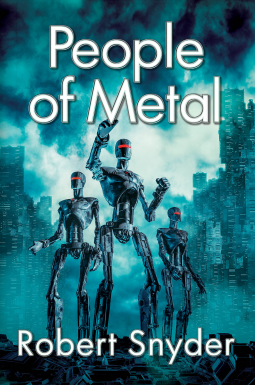
People of Metal
by Robert Snyder
This title was previously available on NetGalley and is now archived.
Send NetGalley books directly to your Kindle or Kindle app
1
To read on a Kindle or Kindle app, please add kindle@netgalley.com as an approved email address to receive files in your Amazon account. Click here for step-by-step instructions.
2
Also find your Kindle email address within your Amazon account, and enter it here.
Pub Date 29 Nov 2018 | Archive Date 30 Mar 2019
Talking about this book? Use #PeopleOfMetal #NetGalley. More hashtag tips!
Description
In 2065, a team at MIT brings to fruition efforts, already well under way today, to make functioning copies of actual human minds. When the mind-copies are installed in advanced robotic hardware whose functionality equals or exceeds the human body’s, the resulting human robots can perform the same work as their biological originals--from carving a sculpture to performing brain surgery.
The well-intentioned leaders of China and the U.S. form a grand partnership to create human robots for every human vocation in every country in the world. The human robots proliferate, economic output soars, and the entire world prospers. It’s a new Golden Age. But there are unintended consequences—consequences that will place biological humanity on a road to extinction. Ultimately, it will fall to the human robots themselves to rescue biological humanity and restore its civilization.
A Note From the Publisher
Advance Praise
“Snyder’s story indulges in the utopian speculation of early sci-fi works.” –KIRKUS REVIEWS
“Snyder’s story indulges in the utopian speculation of early sci-fi works.” –KIRKUS REVIEWS
Available Editions
| EDITION | Ebook |
| ISBN | 9781684331536 |
| PRICE | US$6.99 (USD) |
Average rating from 6 members
Featured Reviews
People of Metal is science fiction with science firmly intact. Readers of this genre in all its fullness will appreciate this approach. What Robert Snyder accomplishes with including a scientific basis is not lost in the least as we encounter characters and conflict. Nicely done.
This one does not easily fall into any category of science ficti0n. I starts with very undeveloped conversation and only slightly improves at the end. This story is one view of how the expansion of AI will impact humans. The author is very generous, according to some theorists, on the timeline for the takeover of the planet from biological humans. Snyder does not dwell much on the impact to the workforce of thinking robots early on. The majority of the book speaks to the saving of the remnants of humanity found in Africa and the ultimate goal of sending humanity to the stars, a la Steven Hawking.
It certainly make a pleasant surprise to see robots revisited, and explored as comprehensively as Asimov used to on his various opuses on robots!
The action takes place over several centuries, as robots are first refined until they become experts at games and tennis, then are the reason for a second arms race to create the most lethal war machines, between the US and China. Eventually, the robots become used as servants to allow biological humans to live a life of ease and luxury. Finally, the minds of individual humans can be uploaded into robot bodies, though the book remains reticent over whether that consciousness really does mean virtual immortality for that original unit of consciousness.
All these developments are noted via a series of conversations over the years that take place between presidents, scientists, members of state and so on. The realpolitik of leaked information, treaties and financial deals expresses a certain cynical realism of how human nature 'works'.
Finally, however, the stage is reached where humans have everything. Now is the time for speculation of what will transpire where no biological human need ever work or do anything for themselves again. But is a Utopic world what humans truly need, or desire?
Either way, humans get the chance to start again, in a different context, guided by metal human beings. Will they be able to avoid the pitfalls of historical failures too? If so, to what will humans aspire to then?
This book is an entertaining read, as it charts our longer-term evolution and future - towards the stars.
Working with such a long time perspective, the characters within it to for the most part, seem so what forgettable, do it can be hard to remember who says what. Because it works mainly through conversations made at different times, there is little in the way of evocative language. However, it certainly does explore well enough what creating sentient robots might mean for the evolution of our species in the long term.






